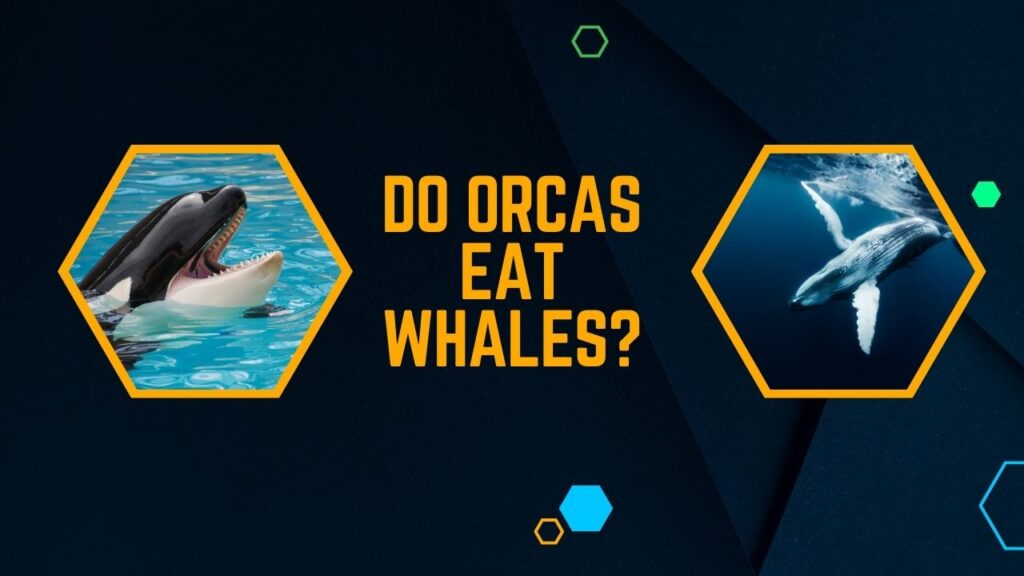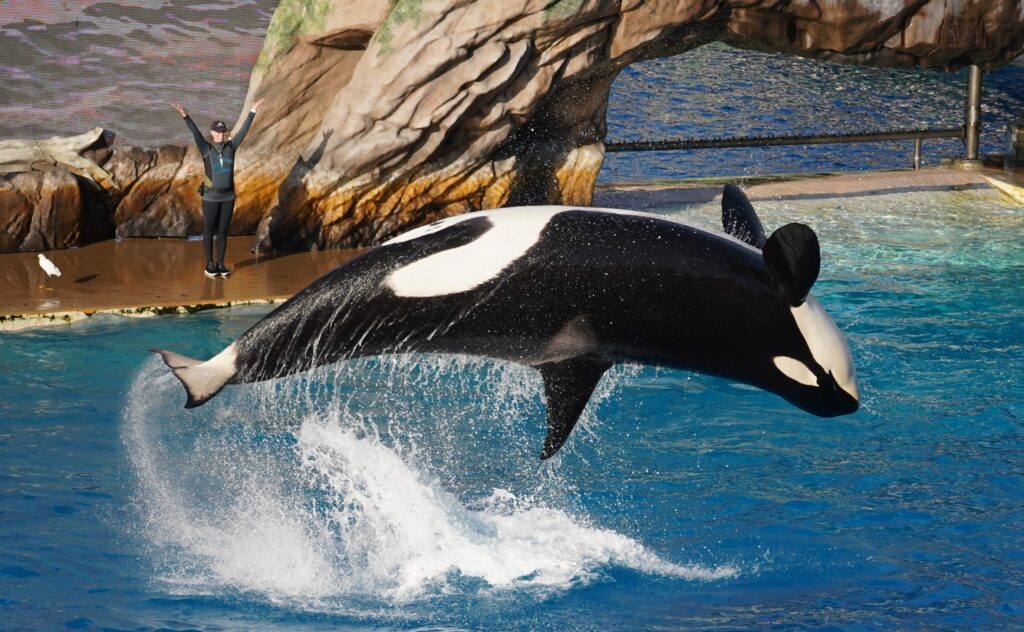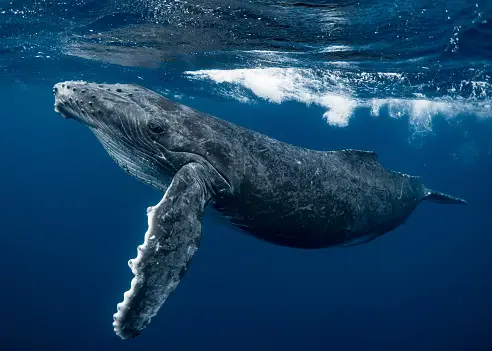
Do Orcas Eat Whales? Yes, orcas, also known as killer whales, do eat whales as part of their diet. Orcas are top predators and have been known to hunt and feed on various species of whales, including baleen whales and even larger-toothed whales.
The apex predators known as orcas, or killer whales, are noted for their varied diet, which includes marine mammals including seals, sea lions, and whales.
Orcas are able to hunt enormous whale species because of their cooperative nature and advanced hunting skills.
Their excellent coordination and communication skills within their social groups are the reason behind their success in whale hunting.
They are considered top predators in marine ecology, but their aggressive behavior toward whales distinguishes them from other dolphins.
The intricate relationships that exist between orcas and whales make studying their interactions an exciting field of study. [Do Orcas Eat Whales?]
Table of Contents
The Orcas’ Diet
Orcas, also known as killer whales, are apex predators renowned for their diverse and opportunistic diet.
Despite their name, which suggests a preference for marine mammals like whales, orcas actually consume a wide range of prey, including fish, seals, sea lions, and even other species of whales.
| Diet Component | Description |
| Fish | Orcas often hunt fish such as salmon, herring, and mackerel, which make up a significant portion of their diet. |
| Marine Mammals | While orcas occasionally prey on smaller marine mammals like seals and sea lions, they also target larger species like dolphins and even other whales. |
| Birds and Squid | In addition to fish and marine mammals, orcas may also consume birds and squid when available in their environment. |
Even though they can take down larger animals, orcas are adept hunters who use a variety of hunting tactics, such as coordinated attacks and cooperative hunting strategies, to successfully capture their prey.
Although orcas do eat whales, they usually go after smaller types of whales, such as dolphins, rather than larger baleen whales.
The complexity of orcas’ feeding behavior and their position as top predators in marine ecosystems are highlighted by this detailed understanding of their nutrition.

See Also: Can You Swim With Killer Whales? Discover the Thrilling Reality!
Orcas Vs. Baleen Whales
The dominant predators in the ocean are orcas, sometimes referred to as killer whales. They hunt and eat a variety of aquatic life, including whales with baleen.
Orcas hunt using a variety of techniques, and they frequently hunt in groups to bring down their prey. Orcas employ their cunning and camaraderie to hunt baleen whales, using these traits to exhaust and overwhelm their much larger prey.
When orcas hunt baleen whales, their predatory behavior is spectacular. They pursue and herd the whales using their quickness and agility, eventually identifying a lesser whale for the assault.
Once separated, the orcas cooperate to overwhelm the whale and render it unconscious with their strong jaws and force.
They then feed on the baleen whale’s blubber and flesh, showcasing their prowess as skilled and efficient hunters. [Do Orcas Eat Whales?]
Killer Whales: Apex Predators
Killer whales, or orcas, hold the title of apex predators in the oceanic realm, commanding respect and awe for their formidable hunting prowess and intelligence.
While their name implies a preference for preying on whales, the reality of their diet is far more diverse and complex.
| Predatory Behaviors | Description |
| Diverse Diet | Orcas exhibit a wide-ranging diet, including fish, seals, sea lions, and even other species of whales. |
| Cooperative Hunting | These highly intelligent marine mammals employ sophisticated hunting techniques, often working together in coordinated groups to capture prey. |
| Opportunistic Feeders | Orcas opportunistically exploit various prey sources, adapting their hunting strategies based on the availability of food in their environment. |
Although orcas do eat whales, they usually choose to hunt smaller whale species, such as dolphins, rather than larger baleen whales.
This sophisticated understanding highlights how intricate their feeding habits and ecological function as top predators are. [Do Orcas Eat Whales?]
Killer whales are essentially lords of the sea, using their cunning, cooperation, and flexibility to keep themselves atop the food chain in the ocean.

See Also: Do Orcas Eat Blue Whales? Discover the Deadly Predators
Misconceptions And Controversies
There’s controversy around whether orcas eat whales or not. While orcas have been known to prey on smaller whale species, there is no evidence of them attacking larger whales.
Despite misconceptions, orcas primarily feed on fish, seals, and sea lions. Any speculation about orcas being whale hunters is purely speculative.
Do Orcas eat Whales? Among scholars and marine enthusiasts, this subject has sparked debates and misconceptions. A frequent misconception is the misidentification of the prey.
Although the largest member of the dolphin family, orcas, commonly referred to as killer whales, are not technically whales.
While orcas are known to consume a wide range of aquatic life, their main diet is other marine mammals like seals, sea lions, and occasionally even dolphins.
On the other hand, orcas have occasionally been seen attacking larger whale species, such as humpback and gray whales. The question of whether orcas intentionally consume whales has been raised by this activity.
Some contend that these incidents can be motivated by other causes or opportunism. To completely comprehend the reasons for these interactions between orcas and whales, more study and research are necessary due to the complexity of this behavior.
See Also: Do Orcas Live In San Diego Bay? Navigating the Waters
Ecological Impact
As apex predators, orcas, commonly referred to as killer whales, do occasionally hunt larger whale species. The intricate relationships between various species and the complexity of marine ecosystems are illustrated by this ecological impact.
Killer whales, or orcas, are important members of the marine ecology. Although fish make up the majority of their diet, they have also been seen to prey on marine animals.
While it is uncommon for orcas to consume mature whales, there are recorded instances where they have targeted juvenile or frail whales.
The relationships that orcas have with other marine animals contribute to the well-being of marine communities. [Do Orcas Eat Whales?]
They have the ability to control the quantity of prey species, reducing the chance of overcrowding and depletion. Orcas indirectly improve the population’s general fitness by preying on the weaker members of the population.
It is important to remember, nevertheless, that orcas have an ecological influence that goes beyond simple predation.
The behavior and movement patterns of other marine species may be affected by their presence in particular locations, which may have an impact on the dynamics and structure of marine ecosystems.

See Also: Are Orcas Dolphins? Debunking the Myth
Conservation Efforts
The majestic orcas, sometimes referred to as killer whales, are creatures of the waters. Despite being apex predators, they don’t usually feed on big whales.
While they occasionally eat whales, orcas also frequently eat fish, seals, and penguins. The balance of marine ecosystems depends on the preservation of whale populations, and several programs have been put in place to safeguard these amazing animals.
Governments and conservation groups from all over the world are putting in endless effort to protect whale habitats and enact laws prohibiting hunting and captivity.
These initiatives seek to lessen the negative effects of human activity, including overfishing, habitat degradation, and pollution, which can jeopardize whales and orcas.
Research and monitoring programs play a pivotal role in understanding and managing their populations, ensuring their long-term survival. [Do Orcas Eat Whales?]
By raising awareness and funding for conservation projects, individuals can actively contribute to the preservation of orcas and the whales they coexist with.
See Also: How Smart Are Orcas Compared To Dolphins? Intelligent Showdown!
Frequently Asked Questions For Do Orcas Eat Whales?
Do Orcas Eat Whales?
Indeed, orcas—otherwise known as killer whales—do consume whales. As apex predators, they have been observed feeding on a variety of whale species, including as gray and minke whales as well as larger whale species like humpback and blue whales. Orcas are incredibly bright and proficient hunters who use their camaraderie and unique hunting methods to bring down their prey.
How Do Orcas Hunt Whales?
Diverse hunting strategies are employed by orcas to capture whales. Pods are the synchronized groups that they frequently work in to encircle and isolate their prey. In order to catch smaller whales, orcas may beach themselves or swim beneath the whale and strike it with their tails. They have a history of immobilizing whales by targeting particular body parts, like the flippers or tail, in order to prepare them for eating.
What Do Orcas Eat Besides Whales?
Although their capacity to hunt whales is well-known, orcas also eat fish, other marine mammals, and even seabirds. Seals, sea lions, dolphins, squid, and different kinds of fish are among the other animals that orcas may eat, depending on their surroundings and the availability of food.
Conclusion
Even though they are fierce predators, orcas don’t usually eat whales on a regular basis. Their favorite foods include fish, seals, and dolphins. On the other hand, orcas have occasionally been reported to prey on and kill smaller whale species.
All things considered, knowing the intricate dynamics of orca behavior and how they interact with other aquatic animals is essential to understanding what they eat.

Mr. Das, a certified pharmaceutical scientist, holds a Bachelor of Science in Pharmaceutical Sciences and passionately contributes to dolphin conservation as a member of the committee in Bangladesh.


